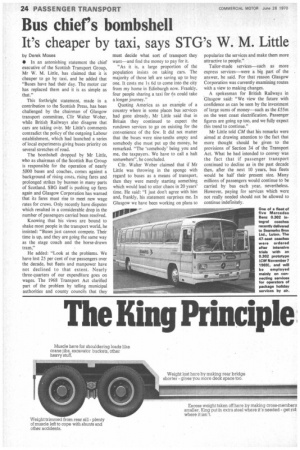Bus chiefs bombshell
Page 26

If you've noticed an error in this article please click here to report it so we can fix it.
It's cheaper by taxi, says STG's W. M. Little
by Derek Moses
• In an astonishing statement the chief executive of the Scottish Transport Group, Mr W. M. Little, has claimed that it is cheaper to go by taxi, and he added that "Buses have had their day. The motor car has replaced them and it is as simple as that."
This forthright statement, made in a contribution to the Scottish Press, has been challenged by the chairman of Glasgow transport committee, CHI. Walter Wober, while British Railways also disagree that cars are taking over. Mr Little's comments contradict the policy of the outgoing Labour establishment, which had launched a series of local experiments giving buses priority on several stretches of road.
The bombshell dropped by Mr Little, who as chairman of the Scottish Bus Group is responsible for the operation of nearly 5000 buses and coaches, comes against a background of rising costs, rising fares and prolonged strikes by busmen in many parts of Scotland. SBG itself is pushing up fares again and Glasgow Corporation has warned that its fares must rise to meet new wage rates for crews. Only recently have disputes which resulted in a considerable drop in the number of passengers carried been resolved.
Knowing that his views are bound to shake most people in the transport world, he insisted: "Buses just cannot compete. Their time is up, and they are going the same way as the stage coach and the horse-drawn tram," He added: "Look at the problems. We have lost 25 per cent of our passengers over the decade, but fleets and manpower have not declined to that extent. Nearly three-quarters of our expenditure goes on wages. The 1968 Transport Act clarified part of the problem by telling municipal authorities and county councils that they must decide what sort of transport they want—and find the money to pay for it.
"As it is, a large proportion of the population insists on taking cars. The majority of those left are saving up to buy one. It costs me 1 s 6d to come into the city from my home in Edinburgh now. Frankly, four people sharing a taxi for 6s could take a longer journey."
Quoting America as an example of a country where in some places bus services had gone already, Mr Little said that in Britain they continued to expect the rundown services to go on existing for the convenience of the few. It did not matter that the buses were nine-tenths empty and somebody else must put up the money, he remarked. "The 'somebody' being you and me, the taxpayers. We have to call a halt somewhere", he concluded.
Cilr. Waiter Weber claimed that if Mr Little was throwing in the sponge with regard to buses as a means of transport, then they were merely starting something which would lead to utter chaos in 20 years' time. He said: "I just don't agree with him and, frankly, his statement surprises me. In Glasgow we have been working on plans to popularize the services and make them more attractive to people."
Tailor-made services—such as more express services—were a big part of the answer, he said. For that reason Glasgow Corporation was currently examining routes with a view to making changes.
A spokesman for British Railways in Glasgow said: "We view the future with confidence as can be seen by the investment of large sums of money—such as the L55m on the west coast electrification_ Passenger figures are going up too, and we fully expect this trend to continue."
Mr Little told CM that his remarks were aimed at drawing attention to the fact that more thought should be given to the provisions of Section 34 of the Transport Act. What he had intended to convey was the fact that if passenger transport continued to decline as in the past decade then, after the next 10 years, bus fleets would be half their present size. Many millions of passengers would continue to be carried by bus each year, nevertheless. However, paying for services which were not really needed should not be allowed to continue indefinitely.






















































































































